外研版(2019)必修第一册Unit 5 Into the wild Using language 课件(21张PPT)
文档属性
| 名称 | 外研版(2019)必修第一册Unit 5 Into the wild Using language 课件(21张PPT) | 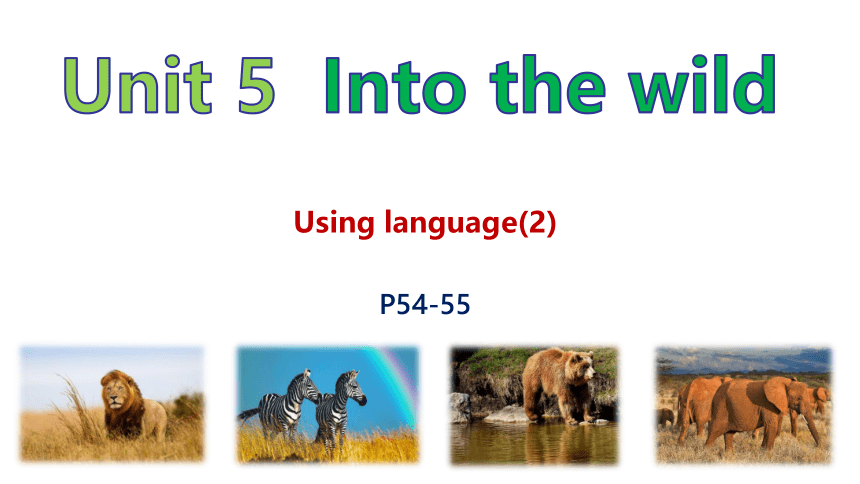 | |
| 格式 | pptx | ||
| 文件大小 | 20.0MB | ||
| 资源类型 | 教案 | ||
| 版本资源 | 外研版(2019) | ||
| 科目 | 英语 | ||
| 更新时间 | 2022-12-06 17:09:59 | ||
图片预览

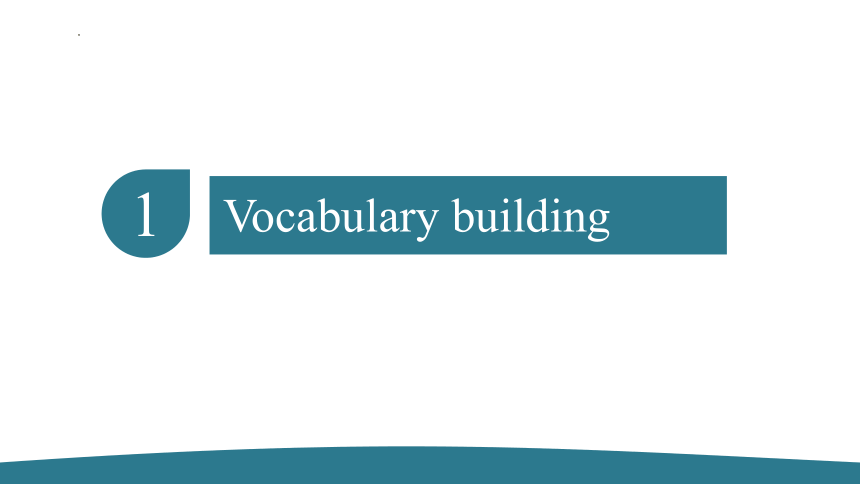
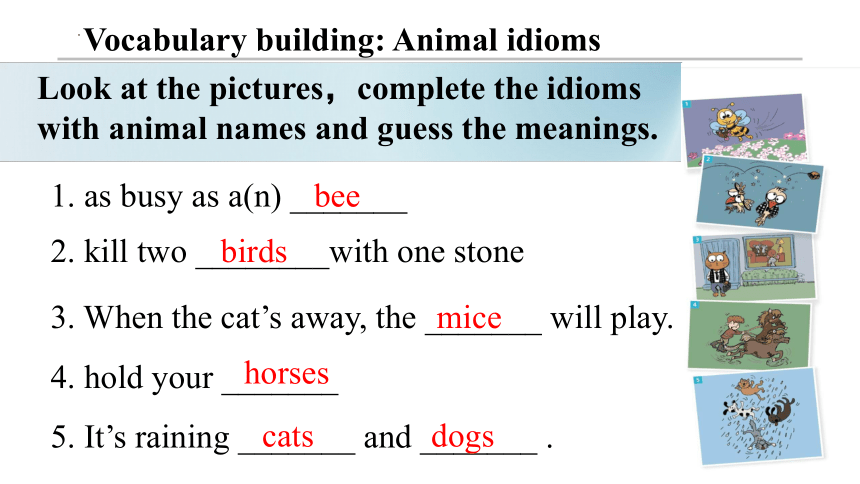
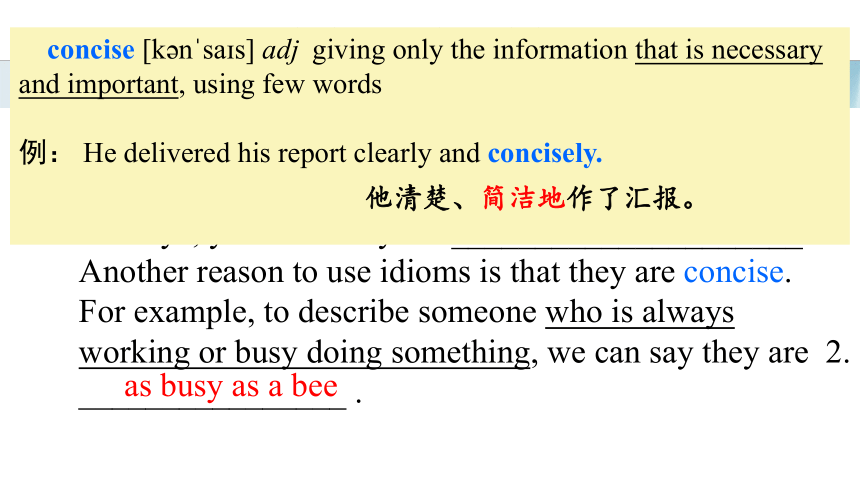
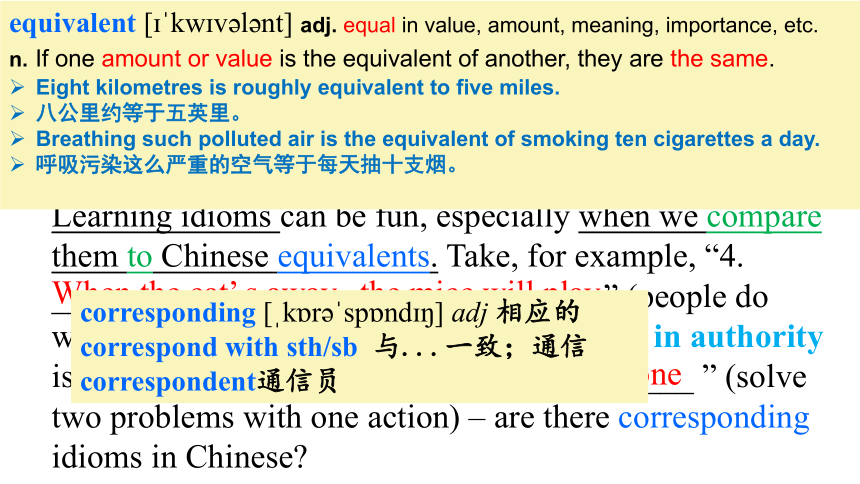
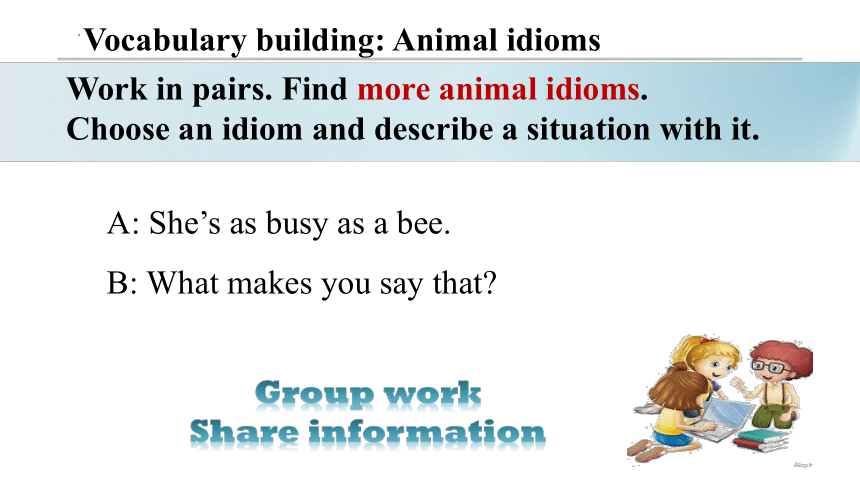

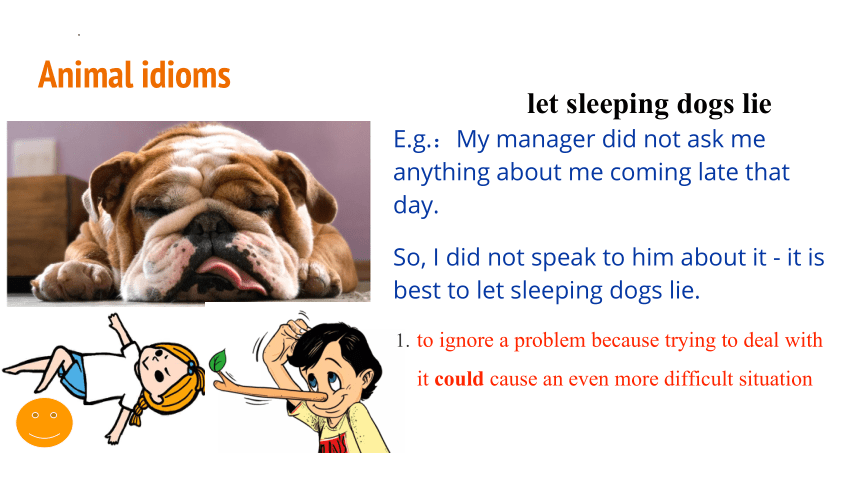
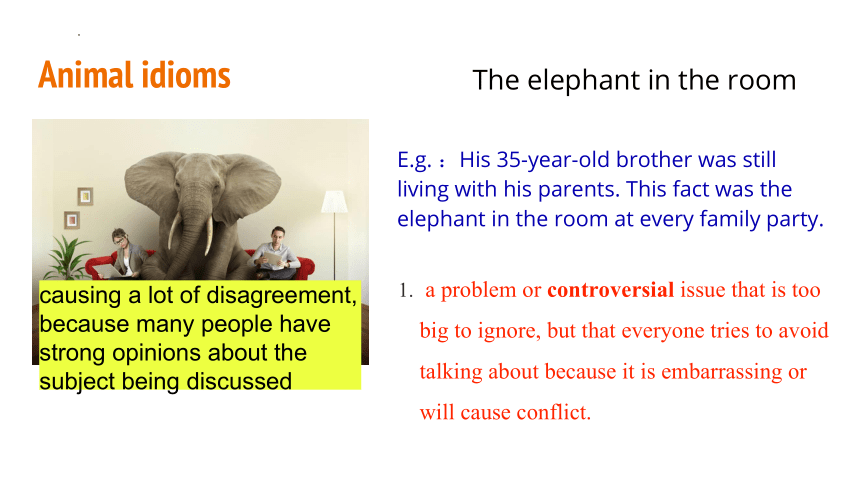
文档简介
(共21张PPT)
Unit 5 Into the wild
Using language(2)
P54-55
1
Vocabulary building
Vocabulary building: Animal idioms
1. as busy as a(n) _______
2. kill two ________with one stone
3. When the cat’s away, the _______ will play.
4. hold your _______
5. It’s raining _______ and _______ .
bee
birds
mice
horses
cats
dogs
Look at the pictures,complete the idioms with animal names and guess the meanings.
Vocabulary building: Animal idioms
English idioms are a way of adding colour to the language. For example, instead of saying “It’s raining heavily”, you could say “1. _____________________”. Another reason to use idioms is that they are concise. For example, to describe someone who is always working or busy doing something, we can say they are 2. ________________ .
It’s raining cats and dogs
as busy as a bee
Complete the paragraph with the animal idioms.
concise [k n sa s] adj giving only the information that is necessary and important, using few words
例: He delivered his report clearly and concisely.
他清楚、简洁地作了汇报。
If they’re rushing into something and should wait and be patient, you could say “3. ______________ ”. Learning idioms can be fun, especially when we compare them to Chinese equivalents. Take, for example, “4. _________________________________” (people do what they want and have fun when someone in authority is absent) and “5. ________________________ ” (solve two problems with one action) – are there corresponding idioms in Chinese
hold your horses
When the cat’ s away, the mice will play
kill two birds with one stone
equivalent [ kw v l nt] adj. equal in value, amount, meaning, importance, etc.
n. If one amount or value is the equivalent of another, they are the same.
Eight kilometres is roughly equivalent to five miles.
八公里约等于五英里。
Breathing such polluted air is the equivalent of smoking ten cigarettes a day.
呼吸污染这么严重的空气等于每天抽十支烟。
corresponding [ k r sp nd ] adj 相应的
correspond with sth/sb 与...一致;通信
correspondent通信员
Vocabulary building: Animal idioms
A: She’s as busy as a bee.
B: What makes you say that
Work in pairs. Find more animal idioms.
Choose an idiom and describe a situation with it.
Group work
Share information
Love me, love my dog.
Don’t ride the high horse.
Never offer to teach fish to swim.
Fine feathers make fine birds.
more animal idioms
爱屋及乌。
勿摆架子。
不要班门弄斧。
人凭衣裳马凭鞍。
Animal idioms
E.g.:My manager did not ask me anything about me coming late that day.
So, I did not speak to him about it - it is best to let sleeping dogs lie.
let sleeping dogs lie
to ignore a problem because trying to deal with it could cause an even more difficult situation
Animal idioms
E.g. :His 35-year-old brother was still living with his parents. This fact was the elephant in the room at every family party.
The elephant in the room
a problem or controversial issue that is too big to ignore, but that everyone tries to avoid talking about because it is embarrassing or will cause conflict.
causing a lot of disagreement, because many people have strong opinions about the subject being discussed
Animal idioms
E.g. Ann let the cat out of the bag and finally told her parents about her plans of getting married.
Let the cat out of the bag
to reveal a secret.
to make sth known to sb
Animal idioms
E.g. When I told my mom I would be home around 2 am, she had a cow!
someone has a cow
someone is really upset.
Animal idioms
E.g. I never learned how to use a computer, so I lost my job to a new employee. It's a dog-eat-dog world.
Dog-eat-dog world
only the strong or the best survive.
2
Listening & speaking
which animal was the first to have been domesticated
Which zoo has the longest history in China
Did you know P.55
to make a wild animal used to living with or working for humans
1驯养,驯化(动物)
to grow plants or crops for human use
2驯化,培育(植物或农作物)同义词: cultivate
to make sb good at cooking, caring for a house, etc.; to make sb enjoy home life
3(often humorous) 使精于家务;使喜爱家居
Some men are very hard to domesticate.
有些男人很难做好家务活。
They've become a lot more domesticated since they got married.
他们婚后恋家多了。
[d mest ke t]
which animal was the first to have been domesticated
Which zoo has the longest history in China
Did you know P.55
Dogs were first domesticated over 14,000 years ago. Sheep, cows and pigs have been kept at home as sources of food for around 7,000 years.
The oldest zoo in the world is in Vienna, opened in 1752. The oldest zoo in China is Beijing Zoo, which was founded in 1906.
In a debate, first listen out for the main topic. This is usually a statement or question at the very start of the debate. Speakers will state whether they are for or against the statement. Then, they will introduce their supporting arguments with expressions such as We must remember that… and We can’t deny that…
How to debate
While-listening
1. Can zoo animals survive in the wild
2. Can zoos offer animals their natural environment
3. Should we keep wild animals in zoos
4. Should we educate people more about animals
Listen to the TV debate and complete Exercise7&8 on page55.
7.choose the correct topic
8.Listen again and complete the mind map.
Activity 8
1. in danger of dying out
2. educate people about animals
3. natural environments
4. depend too much on humans
5. as good as
6. do more good for
Listen again and complete the mind map.
Now talk about how the speakers express agreement and disagreement. Listen again if necessary.
Now talk about how the speakers express agreement and disagreement. Listen again if necessary.
Agreement
Exactly!
I agree.
That is true.
I see your point.
No doubt about it.
I suppose so.
Disagreement
I don’t agree.
That’s just not true.
I’m afraid I totally disagree.
I’m not so sure about that.
I don’t think so.
That’s not always the same.
Listening & speaking: Speaking
Work in pairs. Hold a debate on whether we should keep animals as pets.
1.Stand up and move to your like-minded.
2. Discuss to get as many supporting arguments as possible.
3. Get ready to fire!
A debate on whether we should keep animals as pets.
Student A: Turn to Page 83.
Student B: Turn to Page 86.
Unit 5 Into the wild
Using language(2)
P54-55
1
Vocabulary building
Vocabulary building: Animal idioms
1. as busy as a(n) _______
2. kill two ________with one stone
3. When the cat’s away, the _______ will play.
4. hold your _______
5. It’s raining _______ and _______ .
bee
birds
mice
horses
cats
dogs
Look at the pictures,complete the idioms with animal names and guess the meanings.
Vocabulary building: Animal idioms
English idioms are a way of adding colour to the language. For example, instead of saying “It’s raining heavily”, you could say “1. _____________________”. Another reason to use idioms is that they are concise. For example, to describe someone who is always working or busy doing something, we can say they are 2. ________________ .
It’s raining cats and dogs
as busy as a bee
Complete the paragraph with the animal idioms.
concise [k n sa s] adj giving only the information that is necessary and important, using few words
例: He delivered his report clearly and concisely.
他清楚、简洁地作了汇报。
If they’re rushing into something and should wait and be patient, you could say “3. ______________ ”. Learning idioms can be fun, especially when we compare them to Chinese equivalents. Take, for example, “4. _________________________________” (people do what they want and have fun when someone in authority is absent) and “5. ________________________ ” (solve two problems with one action) – are there corresponding idioms in Chinese
hold your horses
When the cat’ s away, the mice will play
kill two birds with one stone
equivalent [ kw v l nt] adj. equal in value, amount, meaning, importance, etc.
n. If one amount or value is the equivalent of another, they are the same.
Eight kilometres is roughly equivalent to five miles.
八公里约等于五英里。
Breathing such polluted air is the equivalent of smoking ten cigarettes a day.
呼吸污染这么严重的空气等于每天抽十支烟。
corresponding [ k r sp nd ] adj 相应的
correspond with sth/sb 与...一致;通信
correspondent通信员
Vocabulary building: Animal idioms
A: She’s as busy as a bee.
B: What makes you say that
Work in pairs. Find more animal idioms.
Choose an idiom and describe a situation with it.
Group work
Share information
Love me, love my dog.
Don’t ride the high horse.
Never offer to teach fish to swim.
Fine feathers make fine birds.
more animal idioms
爱屋及乌。
勿摆架子。
不要班门弄斧。
人凭衣裳马凭鞍。
Animal idioms
E.g.:My manager did not ask me anything about me coming late that day.
So, I did not speak to him about it - it is best to let sleeping dogs lie.
let sleeping dogs lie
to ignore a problem because trying to deal with it could cause an even more difficult situation
Animal idioms
E.g. :His 35-year-old brother was still living with his parents. This fact was the elephant in the room at every family party.
The elephant in the room
a problem or controversial issue that is too big to ignore, but that everyone tries to avoid talking about because it is embarrassing or will cause conflict.
causing a lot of disagreement, because many people have strong opinions about the subject being discussed
Animal idioms
E.g. Ann let the cat out of the bag and finally told her parents about her plans of getting married.
Let the cat out of the bag
to reveal a secret.
to make sth known to sb
Animal idioms
E.g. When I told my mom I would be home around 2 am, she had a cow!
someone has a cow
someone is really upset.
Animal idioms
E.g. I never learned how to use a computer, so I lost my job to a new employee. It's a dog-eat-dog world.
Dog-eat-dog world
only the strong or the best survive.
2
Listening & speaking
which animal was the first to have been domesticated
Which zoo has the longest history in China
Did you know P.55
to make a wild animal used to living with or working for humans
1驯养,驯化(动物)
to grow plants or crops for human use
2驯化,培育(植物或农作物)同义词: cultivate
to make sb good at cooking, caring for a house, etc.; to make sb enjoy home life
3(often humorous) 使精于家务;使喜爱家居
Some men are very hard to domesticate.
有些男人很难做好家务活。
They've become a lot more domesticated since they got married.
他们婚后恋家多了。
[d mest ke t]
which animal was the first to have been domesticated
Which zoo has the longest history in China
Did you know P.55
Dogs were first domesticated over 14,000 years ago. Sheep, cows and pigs have been kept at home as sources of food for around 7,000 years.
The oldest zoo in the world is in Vienna, opened in 1752. The oldest zoo in China is Beijing Zoo, which was founded in 1906.
In a debate, first listen out for the main topic. This is usually a statement or question at the very start of the debate. Speakers will state whether they are for or against the statement. Then, they will introduce their supporting arguments with expressions such as We must remember that… and We can’t deny that…
How to debate
While-listening
1. Can zoo animals survive in the wild
2. Can zoos offer animals their natural environment
3. Should we keep wild animals in zoos
4. Should we educate people more about animals
Listen to the TV debate and complete Exercise7&8 on page55.
7.choose the correct topic
8.Listen again and complete the mind map.
Activity 8
1. in danger of dying out
2. educate people about animals
3. natural environments
4. depend too much on humans
5. as good as
6. do more good for
Listen again and complete the mind map.
Now talk about how the speakers express agreement and disagreement. Listen again if necessary.
Now talk about how the speakers express agreement and disagreement. Listen again if necessary.
Agreement
Exactly!
I agree.
That is true.
I see your point.
No doubt about it.
I suppose so.
Disagreement
I don’t agree.
That’s just not true.
I’m afraid I totally disagree.
I’m not so sure about that.
I don’t think so.
That’s not always the same.
Listening & speaking: Speaking
Work in pairs. Hold a debate on whether we should keep animals as pets.
1.Stand up and move to your like-minded.
2. Discuss to get as many supporting arguments as possible.
3. Get ready to fire!
A debate on whether we should keep animals as pets.
Student A: Turn to Page 83.
Student B: Turn to Page 86.
